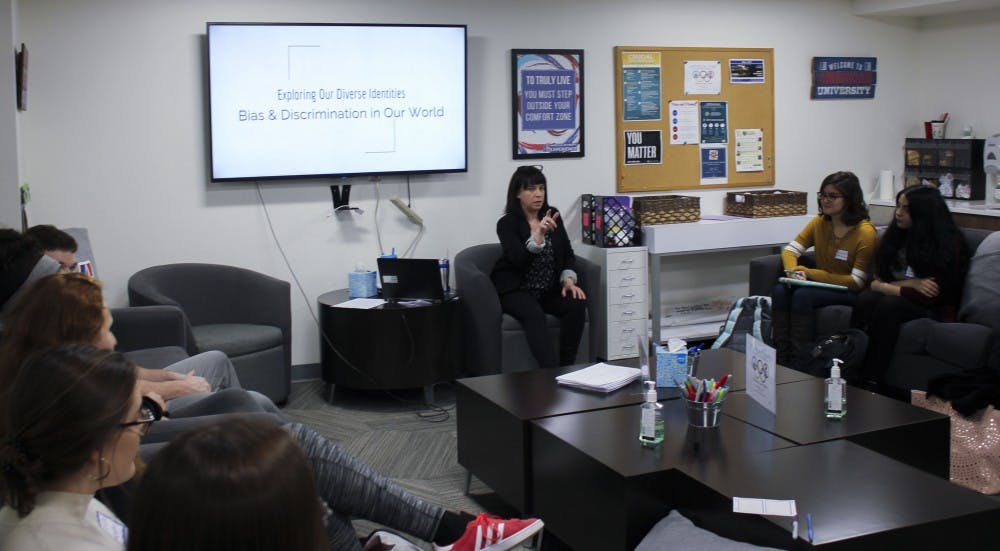Starting this fall, the University’s new general education program will be officially implemented for the class of 2022. With the program comes the AU Experience, or AUx, curriculum, a first-year course that is mandatory for all incoming students.
According to Brad Knight, manager of the AU Core and AU Core Assessment, the University’s general education program had been untouched since 1989. However, in recent years, the University transformed the program to better prepare students for their chosen careers, including careers that have not been created yet, Knight said.
The change came about when the University recognized “that the program was not serving students and what they needed to be successful after they graduate,” Knight said. He noted that the Faculty Senate, the governing body for expressing faculty interests at AU, unanimously approved the new general education program. That type of support is “virtually unheard of” in higher education, Knight said.
“These kinds of changes on a campus, because they touch every part of the institution, really are once in a generation,” Knight said.
The new curriculum is centered around the theme that students need to be prepared to engage and adapt in an always-changing and complex world, Knight said. The three main pieces of the program are “habits of mind” courses, integrative courses and foundation courses.
Habits of mind have five themes: Creative-Aesthetic Inquiry, Cultural Inquiry, Ethical Reasoning, Natural-Scientific Inquiry and Socio-Historical Inquiry. Students will be required to take a class from each theme regardless of their major, similar to the way students at the sophomore level and above did with the five foundational areas as part of the now outgoing general education program: Creative Arts, Traditions that Shape the Western World, The Global and Cross-Cultural Experience, Social Institutions and Behavior, and the Natural and Mathematical Sciences.

GRAPHIC BY JENNIFER CRONEY/THE EAGLE
“Our faculty has been talking about interdisciplinarity for a long time and this is really proving to be a catalyst for that,” Knight said.
The main piece of the integrative courses, which won’t be implemented until 2019, is the capstone. The capstone is a project or senior exhibition for students to present work that they’ve learned during their years in college.
“This will be the first moment on campus where every major will have one and there will be a set of unifying outcomes that we’ll expect every student to be able to walk away with,” Knight said.
As a part of the foundation courses, first-year students will be required to take one Complex Problems seminar. These seminars were piloted in 2016 and will be taught by faculty members who are teaching in “their own passion area." Some of the fall seminars include topics like "Let's Talk About Sex Education," "Obesity: A Complex Crisis," and "How are Latinxs Changing [the] U.S."
“All of those [Complex Problems] classes have at least three co-curricular activities that will get you out in the city or having people from the city come into the classrooms to talk so it will be making the city into a lab,” Knight said.
Along with the Complex Problems seminar, students will also have to take a Quantitative Literacy course and a Written Communication and Literacy course as a part of the foundation courses. Unlike past years, students will not be able to use their AP credits to fulfill these basic math and writing courses. AP credits will only be counted toward elective courses.
The University hopes that this change will put students on a more equal playing field, according to Knight. However, students who do pass their AP exams will be able to place in higher-level writing and math courses, Knight said.
But incoming freshmen like Kada Jackel say they are “extremely frustrated” by the new AP policy.
“We should be allowed to fulfill those requirements because we already completed a college level course,” Jackel said.
How AUx fits into the new general education program
The first-year experience class, AUx, is a mandatory full-year AU Core Curriculum course meant to help students in their transition from high school to college and teaches skills like managing time, budgeting and navigating the campus. The class is split up into two sections: AUx 1 and AUx 2.
While AUx 1 is centered around building life skills in order to adjust to campus life, AUx2 focuses on creating an unified and understanding community because each student has a different background and varying beliefs and views, AUx1 Faculty Director Stef Woods said.
“What is really wonderful about the AUx 1 curriculum is that it is AU centric,” Izzi Rose Stern, the program manager of AUx, said. “It is very much focused on this campus environment, but it is also general enough that it will be helpful to students beyond the AU environment and even as they are planning ahead for after graduation.”
According to the National Center for Education Statistics, the nationwide retention rate for first-year students at four-year colleges in 2016 was 81 percent, meaning that 81 percent of freshmen in the U.S. returned to their universities for a second year.
However, at AU, the retention rate is about 88 percent. Under the AUx pilot program, the retention rate for the freshmen involved was 93 percent, which is why Woods thinks the program is working.
“This has the ability to be adapted for each individual to benefit in the short term as first-years, and in their four years at AU with a better understanding of campus resources and an increased sense of community,” Woods said.
Rick Tyrrell, a rising sophomore who took the AUx pilot class, said he “got the push he needed,” which is why he will be returning as a peer facilitator in the fall. Peer facilitators work as co-teachers to a faculty member throughout the course.
“I felt like my facilitator and peer facilitator helped me a lot with my freshman problems such as being homesick,” Tyrrell said.
Woods said the fall AUx course helps students transition to college and provides “a foundation for the deeper discussions” students will have when they take AUx2 in the spring semester.
“Our students come from various backgrounds and it is important for students to understand the backgrounds of their peers,” Stern, the AUx program manager, said.
Incoming freshman Mollie Russell thinks the new core program will be helpful in transitioning students to life at AU.
“Since American is such a diverse school, it is going to be a culture shock for some people coming from smaller areas or just places that aren’t quite as diverse, and I feel like it will definitely help to start a conversation,” Russell said.
Alejandro Irizarry, also an incoming freshman, believes the new core program will teach students valuable lessons, specifically about pre-existing biases.
“It's really hard to recognize biases that exist like that, so having a formal class to teach students how to find and deal with them is a really valuable resource,” Irizarry said.
This story has been updated.





